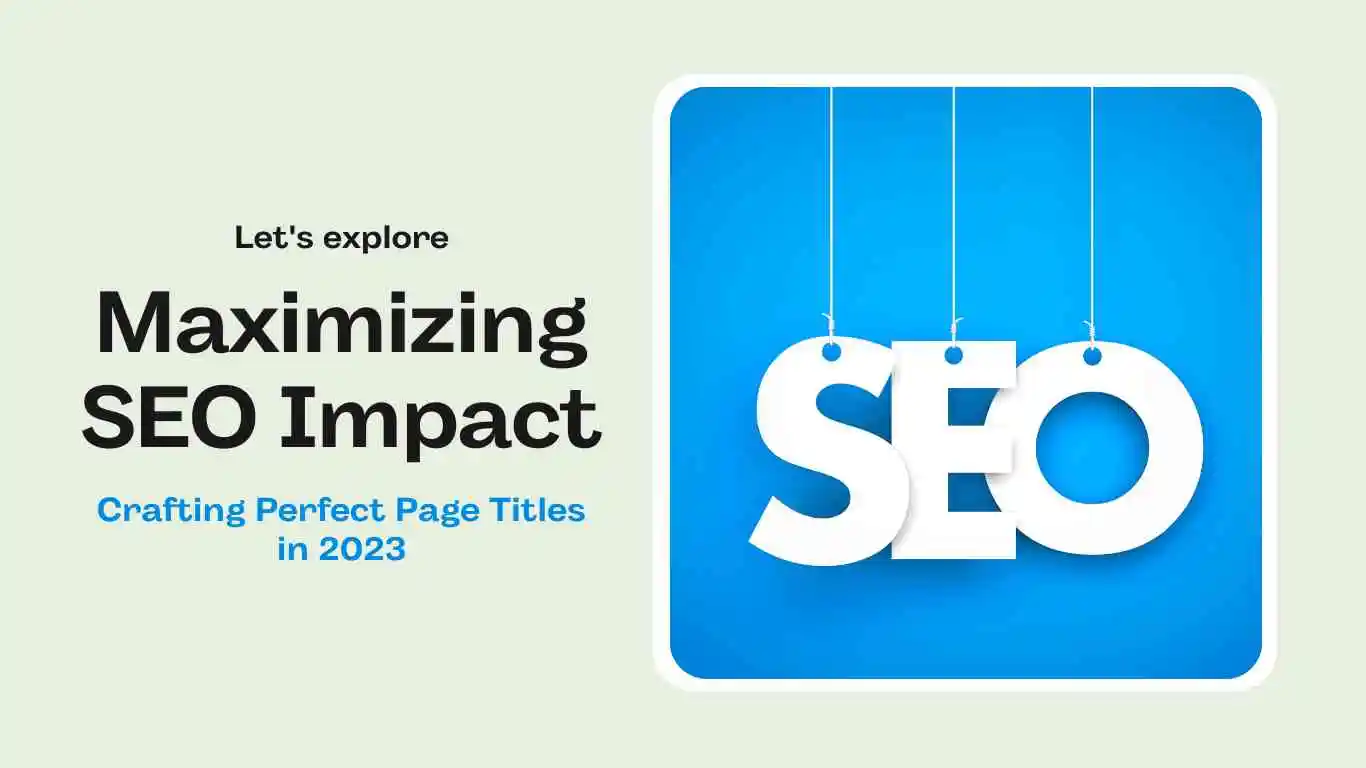Whether you’re an experienced SEO professional or just starting your SEO journey, it’s crucial to understand the significance of meta titles or SEO page titles as essential ranking factors. Meta titles provide a concise summary of your webpage’s content and serve as an opportunity to communicate to search engines, like Google, the keywords your pages should rank for in organic search results. In this article, we’ll delve into the role of title tags, guide you in crafting optimal page titles, and discuss the ideal length you should aim for in 2023.
Understanding Title Tags
Title tags, also known as meta title tags, are HTML code elements that specify the title of a web page. They are visible in the browser title bar and search engine results pages (SERPs) on Google. Essentially, title tags are the clickable links that users rely on to access websites from search results.
Determining the Ideal Page Title Length in 2023
In 2023, the recommended length for title tags is between 50 and 60 characters. This range ensures that your title tag appears correctly on both desktop and mobile browsers, without being truncated by search engines. Keeping your title tag within 50-60 characters allows you to effectively convey your page’s message, improve user experience, enhance brand visibility, and maintain readability.
Significance of Page Titles for SEO and User Experience
Page titles hold vital importance in SEO for several reasons:
- Visibility: Meta title tags are the first element users encounter in SERPs. A well-crafted title tag entices readers to click through to your website, increasing visibility and driving traffic.
- Relevance: Title tags assist search engines in understanding your webpage’s content and relevance to user search queries. They play a crucial role in conveying your page’s intent effectively.
- Branding: In addition to relevance, title tags offer an opportunity to enhance your brand’s visibility and establish authority within your industry.
The Importance of Page Titles as Ranking Factors:
Page titles, meta titles, or SEO titles are undeniably the most critical on-page ranking factors in 2023. While there have been differing opinions on the significance of page titles as a ranking factor, a well-optimized title tag can significantly boost your search engine rankings and organic traffic. Increased clicks to your website translate into higher conversion rates and overall business growth.
Evolution of Ideal Page Title Length:
Over the years, search engines, including Google, have modified their recommended title tag lengths. In 2016, Google temporarily increased the display length to 70 characters, only to revert to the 50-60 character limit shortly afterward. These changes primarily stem from factors such as mobile-first indexing, evolving algorithms, and user experience considerations.
Tips for Crafting the Perfect Title Tag
When writing an effective title tag, keep the following tips in mind:
- Keyword Research: Identify relevant and high-traffic keywords that resonate with your target audience.
- Keyword Placement: Position your primary target keyword at the beginning of the title for maximum impact and visibility.
- Consider Search Intent: Craft a title tag that aligns with your target audience’s needs and search intent, whether it’s informational or transactional.
- Uniqueness and Intrigue: Make your title tag stand out by offering a unique perspective on popular topics, increasing its click-through rate.
Preventing Google from Shortening Your SEO Title Tag
While it can be challenging to predict whether Google will shorten your title tag, you can take certain measures to improve the chances of your specified page title being used:
- Avoid Keyword Overstuffing: Focus on using one or two main keywords that accurately represent your page, rather than stuffing unnecessary keywords or brand names.
- Unique Page Titles: Ensure each page on your website has a distinct title tag to prevent confusion and cannibalization.
- Alternative Characters: Instead of brackets and pipes, which are frequently modified by Google, consider using parentheses and dashes in your title tags.
- User-Centric Approach: Write informative, relevant, and easily understandable title tags that accurately reflect your content and avoid clickbait tactics.
- Alignment with H1 Tags: Maintain consistency and avoid discrepancies by aligning your page title tag with the H1 heading, using similar keywords.
Final Thoughts
In 2023, meta titles under 60 characters are crucial for optimizing your webpage. Invest time in selecting the best title tag with appropriate keywords placed strategically at the beginning. Avoid overstuffing and optimizing excessively, aiming for a balance that allows your website to shine and improve access and traffic. Emphasize the importance of title tags as the most critical on-page ranking factor and make them a priority when creating content for your website.
